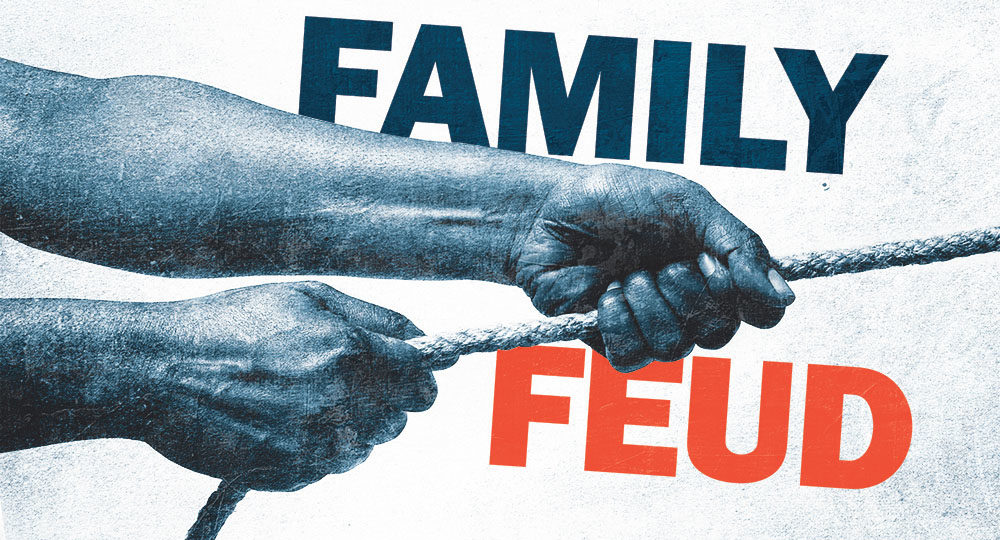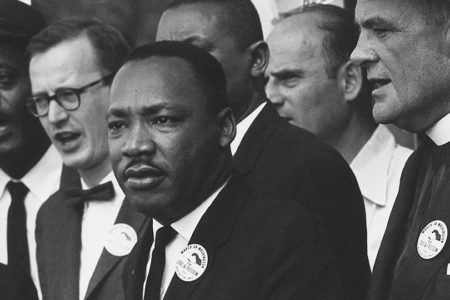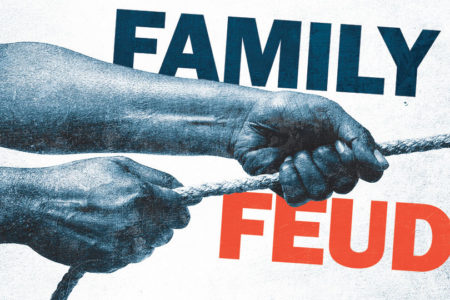Family Feud
A look at Jacob’s time with Laban and God’s boundless grace
God uses all types of circumstances to shape people. Sometimes they are favorable; other times they involve trouble, heartache, and grief. In the case of the patriarch Jacob, the Lord used 20 difficult years in Padan Aram, when Jacob worked for Laban, to mold Jacob’s character and draw him closer to God.
Jacob was 77 when he left Beersheba and went to his mother’s family in Padan Aram. Yet his journey with God had just begun. For the next two decades, Jacob lived in Laban’s world. Previously, others served him. Now he served Laban. He learned to navigate life on his own, apart from his mother’s favoritism, and he matured into a man of God as he appropriated the blessings of the rich and unconditional covenant God made with his grandfather Abraham; reiterated to his father, Isaac; and then reiterated to Jacob himself.
Meeting His Match
When Jacob first arrived in Padan Aram, he immediately fell in love with Laban’s younger daughter, Rachel. Jacob offered to serve Laban seven years for Rachel’s hand in marriage, and the years “seemed only a few days to him because of the love he had for her” (Gen. 29:20).
However, on the evening of the wedding, Laban stealthily switched Rachel for Leah, Rachel’s older sister. When Jacob awoke the next morning and saw he had married Leah, he ran out to Laban: “What is this you have done to me?” he asked. “Was it not for Rachel that I served you? Why then have you deceived me?” (v. 25). All of a sudden, Jacob’s world came crashing down.
Laban’s deception came straight from Jacob’s playbook. Seven years earlier, Jacob had deceived his father by pretending to be his brother, Esau, in order to extract the blessing his father had wanted to give to his other son. Jacob essentially condemned his own deception against Esau when he asked Laban, “Why then have you deceived me?” God used Laban to show Jacob how deceptive and dishonest he was. Jacob may have seen himself in his father-in-law’s duplicitous actions, and the revelation may have sparked the steady spiritual change he desperately needed.
Jacob married Rachel the next week, but not before he promised to serve Laban another seven years.
Conflict in Jacob’s Family
It seems that conflict for Jacob was never far away. And after marrying sisters, it was even closer. Leah, who felt unloved, was blessed by God and gave Jacob his first four sons: Reuben, Simeon, Levi, and Judah. Rachel, unable to conceive for 13 years, was jealous of her sister and demanded of Jacob, “Give me children, or else I die!” (30:1). Jacob demonstrated his faith when he angrily replied, “Am I in the place of God, who has withheld from you the fruit of the womb?” (v. 2).The sisters’ competition for children escalated quickly when Rachel gave her servant Bilhah to Jacob. Bilhah had two boys with him: Dan and Naphtali. Leah then sent her servant Zilpah to Jacob. Zilpah gave birth to Gad and Asher. Leah herself would bear two more sons and a daughter: Issachar, Zebulun, and Dinah. Meanwhile, Rachel remained childless.
The conflict pitted the sisters against each other, and family members began alienating themselves from the Lord, which is evident by the impersonal way they used God’s name. Yet God remained gracious. Eventually, He blessed Rachel, and she gave birth to a son she named Joseph, using the personal name of God when she said, “The LORD shall add to me another son” (v. 24).
Jacob Returns to the Land
Joseph’s birth became a transitional moment in the life of Jacob in exile. He clung to the promise God made to him in Bethel, that He would bring him back to the land of his father. So Jacob turned to Laban, requesting to leave his father-in- law’s house in order to start his own household.
Laban stopped short of outright refusing to let Jacob go and admitted that Jacob’s time serving him greatly increased Laban’s wealth. Laban knew if Jacob left, his wealth was sure to follow him.
A CHRONOLOGICAL TOUR THROUGH THE BIBLE
Walk through this biblical account and many more on a daily basis with A Chronological Tour Through the Bible by Tim LaHaye and Ed Hindson.
Jacob fashioned a plan that appeared to benefit Laban but ultimately favored Jacob. Jacob promised to work for Laban if he could have all the multi-colored lambs and goats, which were an abnormal breed in a sea of single-colored animals. To Laban, this seemed like a win-win situation because Jacob was willing to remain in Padan Aram and work for practically nothing.
Over time, however, the Lord blessed Jacob and multiplied his flocks while Laban’s flocks continued to diminish. Seeing their wealth disappear, Laban and his sons grew hostile toward Jacob, confirming it was time for Jacob to pack up his large family and return to the Promised Land (31:1–21).
Divine Consequences and God’s Grace
The two decades Jacob spent in exile serving Laban left a lasting impression on Jacob’s life. The deceiver was humbled by deception that came from within his own family, and he had to deal with the consequences of his sins. The fact that he was the inheritor of God’s promise didn’t make him immune to the divine repercussions of his wrongdoing. Jacob did not stand above or apart from God’s judgment. His experience with Laban changed his life; and through all of his trials, he knew that God was leading and guiding him.
Jacob’s 20 years with Laban reveal that God’s grace has no parameters. Nothing can sequester God’s lovingkindness and mercy, not even our own sins. Though Jacob’s family was in complete disarray, God still used him to push forward His plan of redemption.
God moves even in chaos. His plan does not stop because we are imperfect or because our family situation is dysfunctional. God’s plan marches right along, which is an element of His matchless grace.Even Leah, who was unloved by Jacob, eventually stopped trying to please him and found her worth in the Lord. When she gave birth to her fourth son, she named him Judah, meaning, “Now I will praise the LORD” (29:35). This same Judah would become the father of the tribe from which the Ruler of Israel would come, Jesus the Messiah. God took the hurt and pain of Leah’s relationship with Jacob and turned it into something beautiful.
Jacob went to Padan Aram with a divine promise. He left 20 years later as a husband, father, and prosperous man ready to appropriate the promise with which God had blessed him.









This is my first time on this page, and I find it absolutely incredible. Thank you so much for bringing the pages of the Holy Bible to LIFE!!
Wow, I have just discovered this site + I feel truly blessed.
My plan this year, as an Australan Christian is to study more about Israel + God’s plan for her succession.
Blessings in Jesus Mighty Name,
Melinda